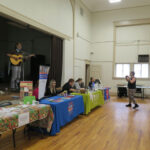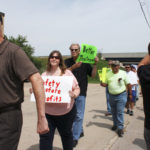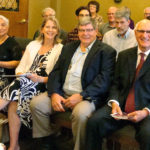After ordination to the diaconate, Deacon Mike Snyder of Our Lady of Lourdes Parish in Bettendorf hoped to begin studies to serve in hospital ministry. But his late wife Patty’s illness was progressing and he was her primary caregiver. He said Bishop Thomas Zinkula told him, “Mike, you have your own little hospital here.” The deacon decided to focus on his caregiving.
Until Patty’s death on Dec. 31, Deacon Snyder was one of an estimated 65 million Americans caring for a loved one. Family caregivers sit beside us in the pew at Mass; they wait in line with us at the grocery store. They don’t stand out in the crowd, but we know them and need to reach out to them. They provide 80 percent of all health care today, says Deb Kelsey-Davis, RN, who created a faith-based ministry for caregivers with Kelly Johnson called Nourish for Caregivers (nourishforcaregivers.com).
The story of Deacon Snyder and his wife’s journey through caregiving appears in this week’s special edition. They agreed before Patty’s death to share their experience, hoping to help others to manage the caregiving journey that also comes with blessings when Christ is placed in the center.
Pope Francis says that God calls Christian couples to “bestow life and to care for life. For this reason the family has always been the nearest ‘hospital.’ So let us care for one another, guide and encourage one another, and experience this as part of our family spirituality” (“The Joy of Love,” No. 321).
God never promised it would be easy, but God also promised to be with us always. “Our faith helps us to understand and to enter into those times of tremendous suffering. It only makes sense in the light of faith,” observes Johnson.
Family caregivers have become a silent majority, performing tasks for their loved ones who may be children or adults. Tasks might include personal care, running errands and chauffeuring to doctor’s appointments. Caregiving is a labor of love, but caregivers need care, too — physically, mentally, emotionally and spiritually.
In a Nourish for Caregivers workshop held Dec. 1 at diocesan headquarters, Kelsey-Davis and Johnson said 63 percent of caregivers are stressed and 40 percent are depressed; 70 percent say that faith is important to them. Nourish for Caregivers is one of the few faith-based, lay-led ministries tailored for use in parishes.
The co-founders started the program because they were searching for spiritual nourishment as a result of their own caregiving experiences. For caregivers, they recommend:
• Ask for and be willing to receiving help.
• Be organized. What are the things you could receive help with? What are the things that should remain on your own plate?
• Recognize what tasks you are good at and what things you don’t particularly like to do and get help for that — volunteer or paid.
• Prepare for care: Who’s going to do what? Make your end of life wishes known through advanced directives. Hold family meetings. That is critically important communication.
Advice for others to support caregivers:
• Pray for caregivers and let them know you are praying for them. Acknowledge and recognize that they are on the caregiving journey.
• Don’t wait to be asked. Make a specific offer. Take a meal over to the caregiver’s house; offer to have a cup of coffee together or to sit with the care receiver so the caregiver can take a break.
• Learn more about caregiving at nourishfor
caregivers.com. Or send a direct email with questions to info@nourishforcaregivers.com.
• Encourage your parish to consider starting a Nourish for Caregivers group.
• Check with your parish, deacons and health care professionals. Many secular support groups also provide resources for caregivers. Amy Neuzil’s book (reviewed in this week’s issue) “Becoming an Alzheimer’s Caregiver” is also an excellent resource for caregivers.
In an interview before his wife’s death, Deacon Snyder wondered “what God is going to do with this experience and knowledge that I’m gaining right now? I’m willing to wait and find out….I think that’s what I’ve learned, to let God lead.”
Barb Arland-Fye, Editor
(arland-fye@davenportdiocese.org)

The Catholic Newspaper of the Diocese of Davenport









